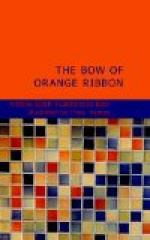It was a dull, drizzling evening; and there was an air of depression in the city, to which he was unusually sensitive. For the trouble between England and her American Colonies was rapidly culminating; and party feeling ran high, not only among civilians, but throughout the royal regiments. Recently, also, a petition had been laid before the king from the Americans then resident in London, praying him not to send troops to coerce his subjects in America; and, when Hyde entered his club, some members were engaged in an angry altercation on this subject.
“The petition was flung upon the table, as it ought to have been,” said Lord Paget.
“You are right,” replied Mr. Hervey; “they ought to petition no longer. They ought now to resist. Mr. Dunning said in the House last night that the tone of the Government to the Colonies was, ’Resist, and we will cut your throats: acquiesce, and we will tax you.’”
“A kind of ‘stand and deliver’ government,” remarked Hyde, whistling softly.
Lord Paget turned upon him with hardly concealed anger. “Captain, you, sir, wear the king’s livery.”
“I give the king my service: my thoughts are my own. And, faith, Lord Paget, it is my humour to utter them when and how I please!”
“Patience, gentlemen,” returned Mr. Hervey. “I think, my lord, we may follow our leaders. The Duke of Richmond spoke warmly for Boston last night. ‘The Bostonians are punished without a hearing,’ he said; ’and if they resist punishment, I wish them success.’ Are they not Englishmen, and many of them born on English soil? When have Englishmen submitted to oppression? Neither king, lords, nor commons can take away the rights of the people. It is past a doubt, too, that his Majesty, at the levee last night, laughed when he said he would just as lief fight the Bostonians as the French. I heard this speech was received with a dead silence, and that great offence was given by it.”
“I think the king was right,” said Paget passionately. “Rebellious subjects are worse than open enemies like the French.”
“My lord, you must excuse me if I do not agree with your opinions. Was the king right to give a government to the Canadians at this precise time? What can his Protestant North-American subjects think, but that he designs the hundred thousand Catholics of Canada against their liberties? It is intolerable; and the king was mobbed this afternoon in the park, on the matter. As for the bishops who voted the Canada bill, they ought to be unfrocked.”
“Mr. Hervey, I beg to remind you that my uncle, who is of the see of St. Cuthbert, voted for it.”
“Oh, it is notorious that all the English bishops, excepting only Dr. Shipley, voted for war with America! I hear that they anticipate an hierarchy there when the country is conquered. And the fight has begun at home, for Parliament is dissolved on the subject.”
“It died in the Roman-Catholic faith,” laughed Hyde, “and left us a rebellion for a legacy.”




